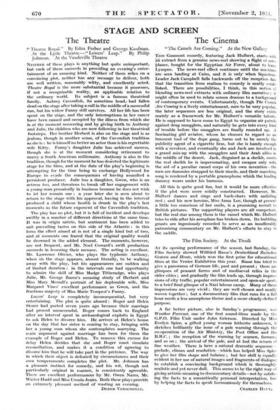STAGE AND SCREEN The Theatre
Theatre Royal." By Edna Ferber and George Kaufman. At the Lyric Theatre.--7" Live& Leap." By Philip Johnson. At the Vaudeville Theatre NEITHER of these plays is anything but quite unimportant, but each of them succeeds in providing an evening's enter- tainment of an amusing kind. Neither of them relies on a convincing plot, neither has any message to deliver, both are well written, reasonably witty, and excellently acted. Theatre Royal is the more substantial because it possesses; if not a recognizable reality, an applicable • relation to the ordinary world. Its subject is - a famous theatrical family. Aubrey Cavendish, its sometime head,. had fallen dead on the stage after taking a call in the middle of a successful run, but his widow Fanny still survives. All her life has been spent on the •stige, and the only interruptions in her career have been caused and occupied by the illness from which she is at the moment recovering and by giving birth to Anthony and Julie, the children who are now following in her theatrical footsteps. Her brother Herbert is also on the stage and is as jealous, though in another sense, of the Cavendish tradition as she : he is himself no better an actor than is his regrettable .wife Kitty. Fanny's daughter Julie has achieved success, though she is at the moment considering retirement to marry a South American millionaire. Anthony is also in the tradition, though for the moment he has deserted the legitimate stage for the films, and at the date of the play's beginning is attempting for the time being to exchange Hollywood for Europe to evade the consequences of having assaulted a persistent producer. Julie has a . daughter, Gwen, who is an actress too, and threatens to break off her engagement with a young man prosaically in business because he does not wish to let her remain one : a year later she is seen about to return to the stage with his approval, having in the interval produced a child whose health is drunk in the play's last moments as the future exponent of the Cavendish tradition.
The play has no plot, but it is full of incident and develops swiftly in a number of different directions at the same time. It was in origin satiric, but sentiment has been added to suit prevailing tastes on this side of the Atlantic : in this form the effect aimed at is not of a single kind but of two, and at moments one; feared that the original' quality would be drowned in the added element. The moments, however, are not frequent, and Mr. Noel Coward's swift production succeeds in lessening their menace. The acting is excellent. Mr. Lawrence Olivier, who plays the typhonic Anthony, when on the stage appears, almost literally, to be walking away with the play, but his appearances are sudden and of limited duration : in the intervals one had opportunity to admire the skill of Miss Madge Titheradge, who plays Julie, Mr. George Zucco's amusing study of Herbert and Miss Mary Merrall's portrait of , his deplorable wife, Miss Margaret Vines' excellent performance as Gwen, and the fractious majesty of Miss Marie Tempest's Fanny.
Lovers' Leap is completely inconsequential, but very entertaining. The plot is quite absurd : Roger and Helen Storer had parted seven years ago because their marriage had proved unsuccessful. Roger comes back to England after an interval spent in archaeological exploits in Egypt to ask Helen to divorce him. He arrives at Helen's house on the day that her sister is coming to stay, bringing with her, a young man whom she contemplates marrying. The main argument against marriage' has been for them the example of Roger and Helen.: To . remove this, excuse for delay Helen decides that she and Roger must simulate reconciliation, and makes it a condition of agreeing to divorce him that he will take part in the pretence. The way in which their object is defeated by circumstances and their own temperaments completes the plot. Mr. Johnson has a pleasant instinct for comedy, and his wit, though not particularly original in essence, is consistently agreeable. There are excellent performances by Mr. Owen Nares, Mr. Walter Hudd and Miss Ursula Jeans. Both these plays provide an extremely pleasant method of wasting an evening.
DEREK VERSCHOYLE.














































 Previous page
Previous page